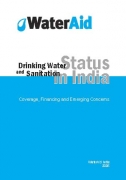Sanitation and Hygiene
UNDP water governance facility at SIWI newsletter
Posted on 22 Nov, 2014 10:30 AMForwarded to the Portal by: Josh Paglia, SIWI 
The UNDP Water Governance Facility (WGF) at the Stockholm International Water Institute (SIWI) is a unique initiative that supports developing countries in their efforts to strengthen water governance and reduce poverty through policy support and advisory services. The latest newsletter from the Water Governance Facility provides updates on activities initiated & much more.
Some highlights are: WGF in Action: From the World Water Forum
At the 5th World Water Forum, 15-22 March, Istanbul, WGF participated in several events. At the seminar Beyond Water Bribes: How to build a corruption-resistant water sector Dr. HÃ¥kan Tropp gave a key note presentation Corruption: The Missing Link in Water Governance. WGF also co-authored parts of the World Water Development Report, 2009: Water in a Changing World, and attended its launch 16 March.
Right to water and sanitation A draft paper by WaterAid
Posted on 22 Nov, 2014 10:30 AM"Right to Water and Sanitation", is a briefing paper (draft) written in March 2009, by Indira Khurana and Richard Mahapatra of WaterAid India, based on secondary research.
The third south Asia conference on sanitation organised by government of India held in Delhi in November 2008 with the theme sanitation for dignity and health
Posted on 22 Nov, 2014 10:30 AMThe Third South Asia Conference on Sanitation (SACOSAN 2008), organised by Government of India, was held in New Delhi, during November 16-21, 2008, with the theme as "Sanitation for Dignity and Health".
Report of steering committee on drinking water supply and sanitation for tenth five year plan and report of working group on natural resource management and water resources for 11th five year plan
Posted on 22 Nov, 2014 10:30 AMReport of steering committee on drinking water supply and sanitation for tenth five year plan
Review of drinking water and sanitation status in India : A report by WaterAid India
Posted on 22 Nov, 2014 10:30 AM This paper by WaterAid India is an assessment of the drinking water and sanitation situation in the country in terms of coverage and financing gaps, if any, keeping the targets of the Millennium Development Goals as a benchmark for the assessment.
This paper by WaterAid India is an assessment of the drinking water and sanitation situation in the country in terms of coverage and financing gaps, if any, keeping the targets of the Millennium Development Goals as a benchmark for the assessment.
Sanitation firmly on the map, But still a long way to go: A position paper for the second South Asia Conference on Sanitation by WaterAid India 2006
Posted on 22 Nov, 2014 10:30 AMThis paper by WaterAid India highlights the progress, key issues and challenges and recommendations for improving sanitation coverage with special focus on the poor. It is based on the experience of WaterAid India, other major sector agencies and NGOs and also takes into consideration the programme of state and national governments of India for sanitation promotion.
Guidelines 2004 for sector reform and successful public private partnerships
Posted on 22 Nov, 2014 10:30 AMWhile recognizing that the urban sector is a State subject (administered by State governments), and water and sanitation are local issues with predominantly local solutions, the Government of India (GoI) believes it has an important and useful role to play in facilitating reforms in urban water supply and sanitation services. This is because:
Debate- Private sector approaches to water management for the poor
Posted on 22 Nov, 2014 10:30 AM"Innovations in Microfinance" Series
A debate on Private Sector approaches to Water Management for the poor provides a unique opportunity to learn about private sectro microfinance approaches to water management that have been used for a range of purposes from purchasing household water connections and clean water storage units, like rainwater harvesting tanks to the construction of household latrines.
The debate sponsored by the Citi Foundation & Arc Finance is to be held at the New York Asia Society and Museum. The event can also be accessed via a free live video webcast. More details below the fold.
Approximately 1.1 billion people lack clean water supplies and 2.7 billion have no access to proper sanitation. To combat conditions that lead to sickness and disease, low income families across Asia are asking for clean water and improved sanitation to keep their families healthy and productive. Sophisticated modern piped water networks are too expensive for most developing countries and poor people living in the slums often pay 5 to 10 times more per liter of water than wealthy people living in the same city. Sensing a business opportunity, microfinance organizations are beginning to explore the market for making water more accessible to the poor.
Data on urban water supply and sewerage for all major cities in India from the CPHEEO 2001
Posted on 22 Nov, 2014 10:30 AMThis database aims to evolve suitable policy in the field of water supply and sanitation sector and is useful in analyzing the data for implementing suitable programmes in India. As a first step, it was proposed to collect data for all 423 Class I cities in the country, as per census 2001 in the already devised and approved formats for Water Supply Sewerage and Solid Waste Management.
Class 1 population greater than 100000 towns and cities across India 2001 census by Central Public Health and Environmental Engineering Organisation CPHEEO
Posted on 22 Nov, 2014 10:30 AMThe Central Public Health and Environmental Engineering Organisation (CPHEEO) is a technical wing of the Ministry of Urban Development, Government of India, and deals with the matters related to urban water supply and sanitation including solid waste management in the country.





